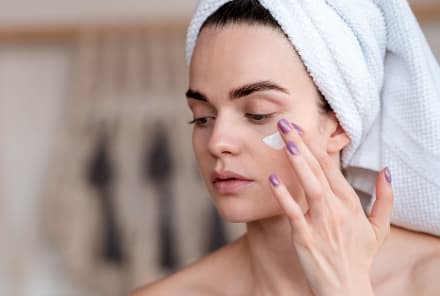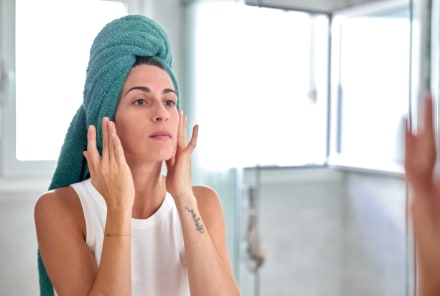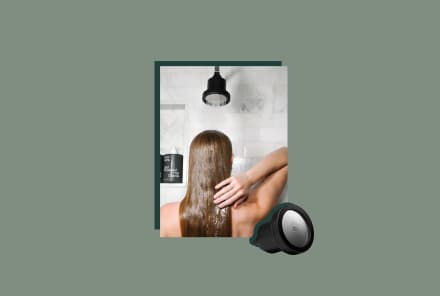Advertisement
Is Laser Hair Removal Safe? Everything You Need To Know (Including The Pain Level)


Laser hair removal is one of those treatments that just sounds intense—so much so, you may feel a bit too scared to take the dive. It's a quick and (sort of) easy way to achieve baby-soft skin in your adult years, but it takes a whole lot of commitment and, um, a pinch of pain tolerance. Considering the fact that there are actual lasers involved, you may be wondering: Is laser hair removal even safe?
We tapped experts to get the scoop on this professional hair removal service—including whether it's actually a safe procedure to try. Keep reading to find out what laser hair removal is, whether it's safe for you, the side effects, and other hair removal options if you aren't ready to get up the gumption just yet.
What is laser hair removal?
According to board-certified dermatologist Hadley King, M.D., laser hair removal treatments emit light of a wavelength that is absorbed by melanin and the root of the hair. "That light energy is converted to heat, which permanently damages and destroys hair follicles," she says.
Winnie Moses, M.D., a board-certified medical aesthetics doctor and founder of Parfaire Medical Aesthetics in Los Angeles, says laser hair removal targets hairs that are in their active growth phase. Once the treatment is complete, those hair follicles are destroyed and won't grow back during the next cycle. But because hair grows in three phases, anagen, catagen, and telogen, not all follicles are in the same stage at the same time—so you'll need multiple laser treatments to optimize the results. "This is why the process of hair removal is typically done in five to six sessions, one month apart," Moses says.
Lots of folks look to laser hair removal for unwanted hair on the face, underarms, legs, and bikini area.
We should also note that this professional hair removal service can be pretty expensive (and not to mention time-consuming)—so it's not a realistic option for everyone. Plenty of people do find it helpful, but by no means is it the only way to get rid of unwanted hair; we'll offer some alternative hair removal methods down below.
So, is laser hair removal safe?
Both King and Moses agree that laser hair removal is generally safe for most people, but there is cause for concern for those with darker skin tones. "Those with darker skin have a higher risk of burns because these devices target melanin, the pigment in our skin and hair," King says. See, you want the device to target the melanin in the hair without damaging the skin, which can be more difficult depending on your skin tone and hair color.
Although, that's not to say those with darker skin tones should avoid laser hair removal entirely: "The newer and more advanced laser hair removal devices have more built-in safety designs," Moses says. "This has significantly reduced the chances of burns to the skin and hyper- or hypo-pigmentation reaction, which is especially found in patients with dark skin tones."
So if you have a darker skin tone and want to take the plunge into laser hair removal, you can totally do so—you just might want to contact an expert to see which type of laser device is best for your skin tone.
Potential side effects of laser hair removal.
Before booking a treatment, take note of these common side effects:
Burns.
As stated above, burns are one of the most common side effects of laser hair removal treatments—especially for those with darker skin tones. If you have dark skin, it's important to consult with a variety of facilities that offer laser hair removal services before booking an appointment. Find a safe, high-quality device and a seasoned professional you trust.
Redness and irritation.
According to Moses, redness, irritation, and itchiness are other common side effects of laser hair removal—regardless of skin tone. "All of these are normal post-treatment inflammatory responses and are [typically] resolved within hours," she says. If your discomfort persists, however, you might want to consult a derm.
Lack of efficacy.
OK, not really a side effect, per se, but another common gripe with laser hair removal is that, well, you don't see any results. This can totally happen, especially if you have lighter hair: Again, the device targets melanin in your skin and hair, so those with lighter hair may find that laser hair removal isn't as effective. If you have blond or even red hair in the area you're looking to get treated, chat with an expert first to ensure that the device being used is best for your skin tone and hair color.
Myths about laser hair removal.
The most common myth Moses hears is that laser hair removal is a permanent solution to complete hair removal. But this is, in fact, not true: "Choosing laser hair removal permanently removes about 80 to 90% of hair after a complete treatment series of five to six sessions, but you may still occasionally experience hair growths that are finer and less noticeable," she notes.
That's why, Moses warms, it's crucial to keep your appointments exactly four to six weeks apart until your initial series is complete. "After completing the series of appointments, maintenance appointments are recommended once or twice a year to maintain maximum results," she adds.
Translation? The treatment won't give you permanent hair reduction: It will reduce the amount of hair after your initial series of sessions (and the hairs that do grow will likely have a finer texture), but you may still need touch-ups every once in a while.
How painful is laser hair removal?
Ah, the million-dollar question: We'll be honest, the process isn't exactly enjoyable. A lot of clients complain about the pain or discomfort during the laser hair removal treatment, but King says most patients do find it tolerable. Many professionals also use a topical anesthetic or numbing cream to make the procedure even more tolerable, but still patients can feel discomfort.
It's often compared to the sensation of flicking a rubber band on your skin repeatedly. Comfortable? Not really. Manageable enough to ignore for 20-or-so minutes? Perhaps.
That said, if you have a low tolerance for pain, start small. Don't dive in with the largest part of your body—stick with a smaller area like the underarms or chin area.
What are some alternatives to laser hair removal?
When it comes to ridding unwanted body hair, the choice is truly yours. (And if you choose not to remove it at all, that is 100% your prerogative.) If laser hair removal seems too daunting or doesn't work with your skin tone or hair color, you can always opt for waxing or sugaring, which typically lasts longer than shaving. Plus, you can create your own sugaring mixture in the comfort of your own kitchen—here's an easy recipe.
If you're looking for another more "permanent" treatment, Moses identifies a procedure that can cause a decrease in hair growth, called electrolysis. "The actual process removes hair using electricity," she says. "But the procedure is exponentially more painful, usually more expensive, and must be done by an electrologist."
The takeaway.
In most cases, laser hair removal is safe. While the process itself may be a bit uncomfortable, if you stick to the regularly scheduled sessions, you'll have better, longer-lasting results. But if you have a darker skin tone or lighter hair, it may not be the best option for you and could even potentially cause damage to the skin—we recommend talking to a professional before booking a treatment. If you're interested in the at-home route, here are our favorite at-home laser hair removal devices.
Watch Next
Enjoy some of our favorite clips from classes
Enjoy some of our favorite clips from classes
What Is Meditation?
Mindfulness/Spirituality | Light Watkins
Box Breathing
Mindfulness/Spirituality | Gwen Dittmar
What Breathwork Can Address
Mindfulness/Spirituality | Gwen Dittmar
The 8 Limbs of Yoga - What is Asana?
Yoga | Caley Alyssa
Two Standing Postures to Open Up Tight Hips
Yoga | Caley Alyssa
How Plants Can Optimize Athletic Performance
Nutrition | Rich Roll
What to Eat Before a Workout
Nutrition | Rich Roll
How Ayurveda Helps Us Navigate Modern Life
Nutrition | Sahara Rose
Messages About Love & Relationships
Love & Relationships | Esther Perel
Love Languages
Love & Relationships | Esther Perel

















